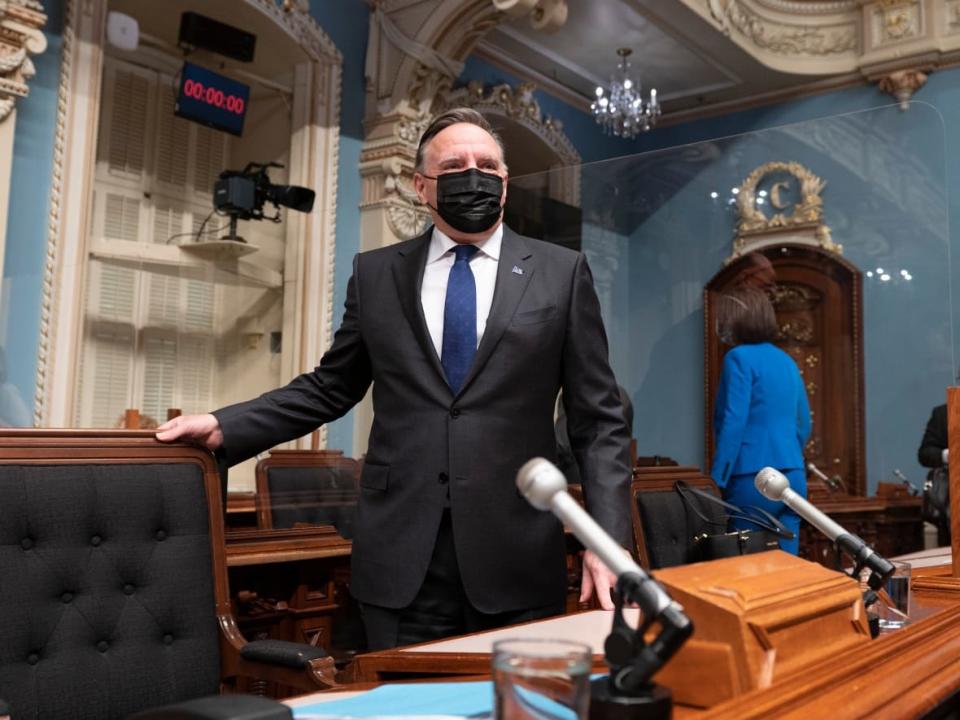Teachers worry Legault government playing politics with upcoming changes to school curriculum

The Legault government will soon unveil details about a new course in its curriculum, and teachers are worried it will present a narrow view of Quebec society.
The new course will focus on Quebec culture and citizenship.
It will replace the Ethics and Religious Culture program, also known as ERC, which has been in place since 2008. It's often been criticized by Quebec nationalists who say it promotes multiculturalism instead of what they consider to be Quebec values.
Premier François Legault kicked off a session of the National Assembly earlier this week, with the next provincial election less than a year away.
During his speech, Legault said scrapping the ERC program for a class on culture and citizenship will help ensure "national cohesion."
"This national cohesion is very precious and must be cultivated from childhood," the premier said during his speech.
"We must pass on to our youth more knowledge about our history, our culture, and the functioning of Quebec society. We must transmit a feeling of pride, of shared citizenship."
Education Minister Jean-François Roberge is expected to reveal what to expect in the new school program during a news conference on Sunday.

Last year, Roberge said the current program, which is taught from elementary through high school, puts too much emphasis on religion. The new program, he said, would include topics like citizen participation, democracy, legal education, sexuality, interpersonal relationships, ethics and eco- and digital-citizenship.
The topic of religions is still expected to be included in the course.
The new program is set to be taught in some schools next year as part of a pilot project, and it will be in primary and secondary schools across Quebec as of 2023.
'Curious to see what national cohesion means'
For Sabrina Jafralie, the head teacher of ethics and religion at Westmount High School, the government is clearly looking to score political points with the new program.
"Isn't that evident right now? We're coming into a provincial election year and it seems again that the death of [the Ethics and Religious Culture program] is being used as a political chess play," said Jafralie.
"ERC is a course that is not paid attention to. Teachers are underdeveloped. They're always given ERC at the end of their schedules. And all of a sudden it's at the forefront of national cohesion."
On Tuesday, Deputy Premier Geneviève Guilbault raised some eyebrows with comments she made about the province's new curriculum.
Guilbault told Radio-Canada the new course would help students become proud Quebecers "with, of course, a little chauvinistic flavour."

Jafralie says she's worried voices from different communities that make up Quebec society will be muted in the new curriculum.
"When this new program was being developed, whose voices are part of this development? Is there an Indigenous voice developed? Is there an Anglo voice developed? Are there racialized communities? Are there people from the LGBTQIA+?'' Jafralie asked.
"I'm very curious to see what national cohesion means, and whose history and whose values are going to be implemented."
In a statement, The Fédération autonome de l'enseignment, which represents nearly 50,000 teachers, said many questions remain unanswered regarding the change in the curriculum.
"What are we talking about when we talk about Quebec citizenship, in relation to which values and by whom will they be defined?" the statement read.
"Is there not a danger of a political drift?"
'Cultural convergence'
Anthony Cooperwood, who teaches the ERC program at Rosemount High School, says he welcomes the idea of helping students become proud Quebecers, but he says curriculum changes that affect what gets discussed and what doesn't make him nervous.
He says the current program helps students understand the diversity that surrounds them on a daily basis.
"If I'm sitting next to a kid and she's wearing a hijab, and I'm sitting next to another kid and that kid is wearing the Star of David around his neck, and I've got another kid and he's got a cross around his neck, I've got three religions around me," he said.

Cooperwood says also he's concerned the province's new program will be, in some ways, redundant.
"If we're talking about promoting the pride of Quebec culture, I know that there are classes that already exist that focus on the history of Quebec," Cooperwood said.
Guillaume Rousseau, a law professor at Université Sherbrooke, advised the Legault government on Quebec's controversial religious symbols law, also known as Bill 21.
He's in favour of doing away with the ERC program.
"It would be good if the new course would be about a different way of looking at vivre-ensemble, living together, maybe something closer to what we call cultural convergence," Rousseau said.
"It's really about building culture all together instead of everyone having his own culture, which is more the multicultural model."
He says he expects there will be skepticism regarding the content of the Quebec culture and citizenship course.
"Some will see it as very nationalist, or something having to do with the ideology of the CAQ [government]," he said. "But I think it should be balanced in a way that most people can agree with the content of the course."

 Yahoo Finance
Yahoo Finance 